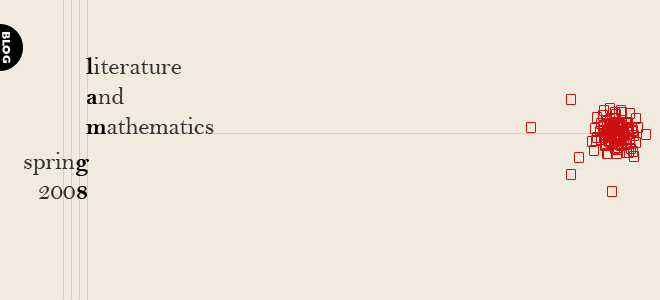I noticed someone already posted a blog about happiness, but I had my mind set on writing about it, and thus, I will do so anyway.
Perhaps I'm in a philosophical mood today and I don't feel like writing about math this time, but I was thinking about the whole issue of happiness in class on Thursday, and I was trying to pinpoint exactly what it means to be "happy" in the One State. The numbers don't know love, or hate, or envy or anything resembling emotion, so how can they know happiness? And why is happiness not considered evil and bad like its peer emotions? I think the way that we define happiness is precisely through other types of emotions. We measure happiness on a scale that identifies how much of each type of emotion are we feeling, and then according to the results of those numbers, we decide if we're feeling miserable, unhappy, happy, very happy or ecstatic. We think of how loved we are (by our parents, our friends, are partners), some consider their financial security to affect their happiness, are we constantly jealous of what others have or are we satisfied with our own achievements? These are factors that affect what we call happiness. In fact, we define happiness as "good fortune; pleasure; contentment; joy." In the One State, they all have similar fortunes, so there isn't "good fortune." People don't feel joy, or excitement, they just stroll through life in utter neutrality. I think that they epitomize the concept of "ignorance is blissed," and without imagination, they will never wonder or get curious about what is possibly out there that they are missing out on. So they continue on with their lives feeling nothing... no pain... no love... no true happiness. However, they have pure comfort. And that's what I think they define as happiness.
Friday, February 1, 2008
Happiness
Subscribe to:
Post Comments (Atom)

3 comments:
I like your analysis of happiness. I agree that it is a hybrid of other emotions.
Since happiness is composed of so many emotions it seems that it would be hard to sustain. All other emotions must line up perfectly to have happiness. And since all emotions are fleeting, happiness is extra fleeting. This makes the "pursuit of happiness" a pursuit. It is because happiness is here one minute, gone the next. One must chase, or pursue it, to have it.
Since you are feeling philosophical, I leave you with some questions:
Can happiness be sustained, be permanent?
If not, doesn't a pursuit of it seem meaningless?
What is worth pursuing?
It is interesting that you point out the inability to have happiness without unhappiness. This is true of most emotions. I think that the citizens' exaltation of the Benefactor is countered by their contempt for the ancient ways. You point out that their lives are comfortable, not happy. Do you believe one can experience comfort without discomfort?
I believe that one must experience discomfort in order to know what comfort (or absence of discomfort) feels like.
Post a Comment